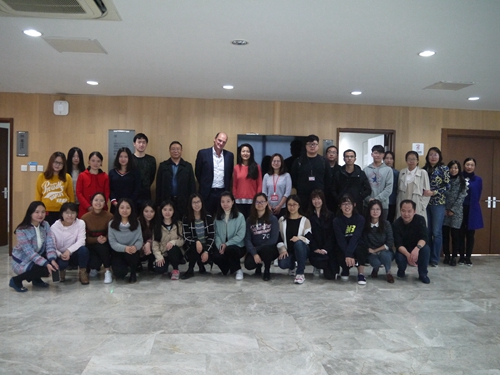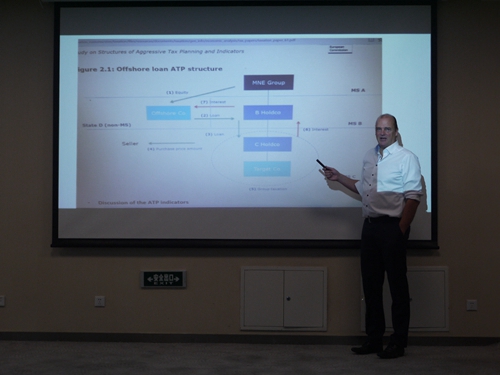Prof. Henk Vording from University of Leiden, Netherlands, teaches EU Tax Law and Policy short course in PKULS.
Date:2017-10-31
On October 12 to 23, 2017, Professor Henk Vording from the Law School of the University of Leiden, Netherlands, visited PKULS and opened a 20-hour short course, European Tax Law and Policy. Dean Zhang Shouwen ,vice dean Wang Xixin, associate professor Zhang Zhiyong, foreign affairs office teacher Yao Yuming warmly received the visiting guests.
On behalf of Peking University Law School, Zhang expressed his sincere greetings and welcome to the visiting guests and introduced the history and current situation of PKULS. PKULS has always attached importance to foreign exchange and cooperation, and committed to cultivating international legal talents. Zhang said that PKULS attaches great importance to the cooperation with Leiden University School of Law. Since the two sides signed a cooperation and exchange agreement in 2012, many exchange students went for exchange learning and the effect is satisfactory. Prof. Henk Vording is the first professor from the Leiden University School of Law who teaches in our school. We hope that we will establish a long-term cooperation mechanism of the exchange of teachers and promote academic exchanges. In particular, in the field of tax law and international tax law, we can hold joint meetings and academic exchanges to promote the cooperation between two sides.
On the morning of October 14, EU Tax Law and Policy was held in Room 307, Koguan Building, and Prof. Zhang Zhiyong made a brief introduction to the background of the course and Prof. Henk Vording. 38 training teachers, graduate students and senior undergraduates attended the course and actively communicated with Prof. Henk Vording after class.

The EU has always been committed to building a single market, but its 28 member states all have their own independent taxation right. In the first week of the course, Prof. Henk Vording taught the coordination mechanism of the EU's tax law .The EU promotes the coordination of taxation among member countries through positive integration and negative integration. In this process, the EU needs to strike a balance between securing the sovereign rights of member countries and achieving the "free flow" of EU treaties. Prof. Henk Vording explained the European Union's approach to balancing the two principles above by giving the cases of the European Court of Justice.
In the second week of the course, Prof. Henk Vording introduced the G20 / OECD Action Plan "Tax Base Erosion and Profit Transfer" (BEPS) in response to international tax avoidance in recent years and explained the measures that EU adopted, including Anti-Tax Avoidance Directives, Parent / Subsidiary Directive, Common Consolidated Corporate Tax Base and so on. Prof. Henk Vording also explained the challenges that the development of digital economy has brought to the traditional EU VAT system. He also introduced the latest developments European Commission has got in this area.

Prof. Henk Vording's curriculum is easy to understand, covering the forefront of the development of EU tax law. His lecture is vivid and humorous. It is generally believed that the students learnt a lot and want to learn something more in the end of the course.
This event is the first teacher exchange program between Leiden University Law School and Peking University Law School. It provide our students an opportunity to expand their horizons and strengthen the further exchanges and cooperation between two sides.
Translated by Wang Ran
Edited by Jin Xingye



